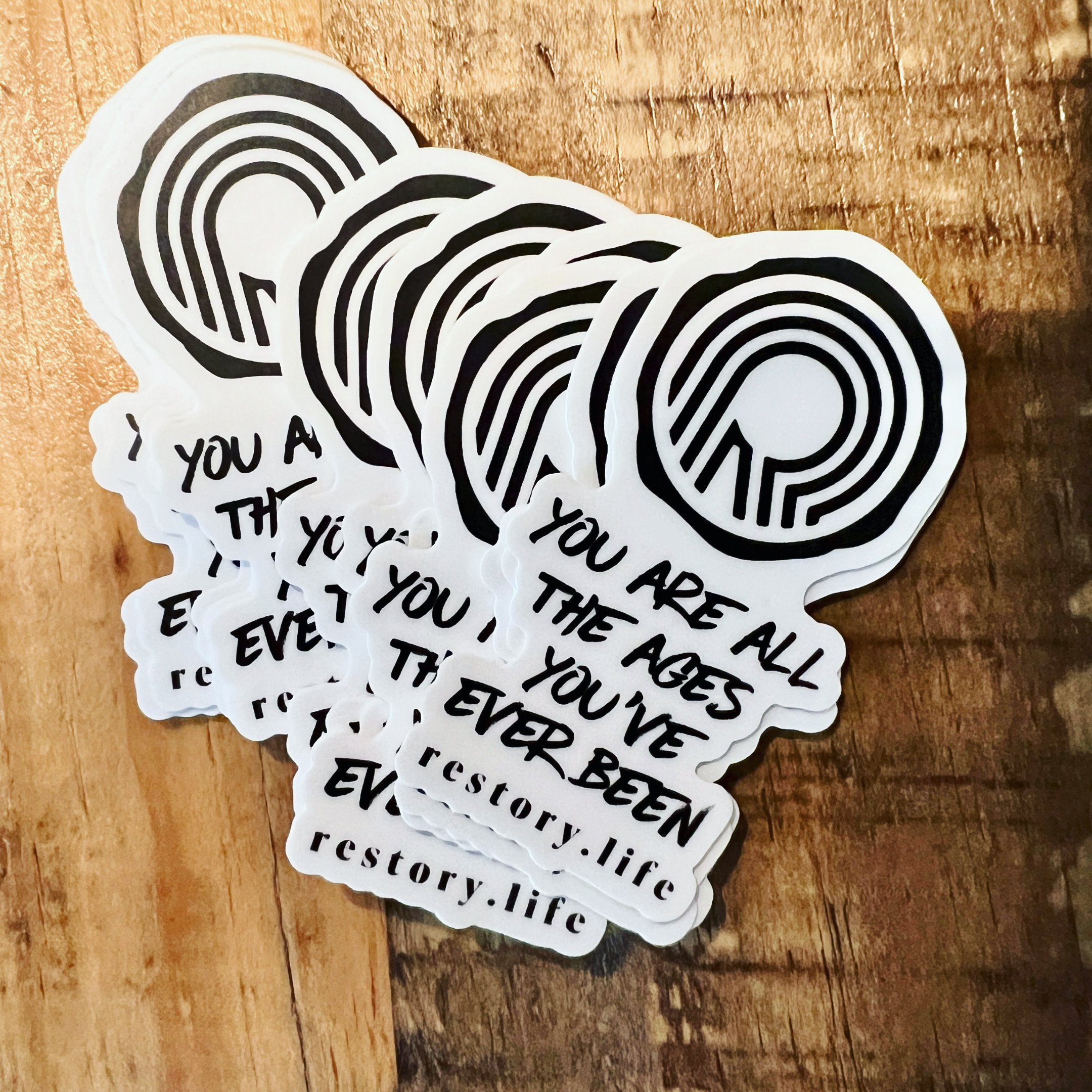Level Two
Next Cohort*: January 27 - April 28, 2025
*Pre-Requisite ReStory Institute Level One Completion
ReStory Institute Level 2 is now full. We are still accepting applications for a waitlist.
ReStory Institute Level 1 introduced you to the the sacred landscape of story.
Level 2 deepens your capacity to navigate, name, and engage stories of harm.
Are you ready for more?
You’ve completed ReStory Institute Level 1 and you hunger for deeper understanding of how our stories are formed.
You enjoyed (and maybe cringed!) at the triadic experience, and long to further hone your skill within the context of facilitated and supervised engagement.
You recognize your passion for story-engagement and want to expand both your theory and praxis.
Level 1 whet your appetite, and you recognize how much you grew in a short 13-week experience. You are ready to take the next step in your professional and/or personal journey of storywork.
The ReStory® Institute Level 2 is designed for practitioners who desire to expand their exposure and skill in the realm of storywork.
How is Level 2 similar or different from Level 1?
Similar: 13-week cohort with weekly pre-recorded video teachings, assigned readings, live virtual all-cohort gatherings for expanded teaching and discussion, and breakout sections for deeper discussion.
Similar but Different: In Level 1, we explored the 4 pillars of the ReStory approach: Story, Withness, The Space Between Us, and ReStorying. In Level 2, we step into the categories of Wounds and Losses, two of the most powerfully shaping elements of our 2nd Stories. In order to truly see “the story deeper still,” we must be trained in the 5 most common wounds and the 5 most common losses humans suffer in our story-formation. We’ll dive into very particular ways these categories of our second stories show up, again and again.
Similar but Different: By far, the greatest positive feedback we receive about Level 1 is the opportunity to practice in the context of the triads. Here, 3 peers and 1 ReStory facilitator meet 6 times to offer opportunities to take theory to practice and sit with others in the context of their stories. Direct and immediate feedback is provided according to the ReStory Rubric to help hone your skill as a practitioner. In Level 2, we have expanded the triads to 9 times, allowing you to have even greater hands-on supervised experience in storywork.
Similar: Level 2 all-cohort gatherings also meet virtually on Mondays, allowing you to participate from wherever you are. There are no in-person gatherings. This provides space to receive the training without significant life-disruption for travel, etc. (Level 3, however, is an in-person experience.)
Different: While Level 1 served as a 101-level introduction to storywork, and particularly to the ReStory Approach, Level 2 deepens your understanding of the particularities of how trauma introduces harm through wounding, and then further deepens our false interpretations through our resulting losses.
Teaching. Processing. Practice. Feedback.
Training like no other.
13-weeks of teaching videos (4.5 hours of teaching) and curated reading assignments processed together in weekly live 1.5-hour virtual groups facilitated by ReStory Counselors.
A total of 9 one-hour triads supervised by ReStory Counselors, offering practice, feedback, and personal story engagement.
A total of 24 hours of instruction and 9 hours of practice and feedback, reflected on a Certificate of Completion.
Completion of Level 2 Certification provides the option of option of applying to work with us as a Storywork Coach, joining ReStory® Institute Level Three, and/or joining group supervision.
ReStory® Institute Curriculum: Level Two
-
Welcome to the ReStory® Institute Level 2! Get to know the other members of this cohort, receive an overview of the path ahead, and begin the process of understanding how our wounds and losses shape our narrative identities.
-
Reviewing and refreshing our understanding of the 4 Pillars of the ReStory Approach, including Story, Withness, The Space Between Us, and ReStorying. We will also review the concepts of 1st and 2nd story, as well as the core postures of awareness, curiosity, and kindness.
-
In a direct assault against God’s image-bearing masterpiece, every human lives a "second story," a distorted narrative that arises from our wounds, losses, and survival mechanisms. This false story, shaped by others' expectations and life's subtle pressures, pulls us away from the original masterpiece God designed us to be. This week, students will be introduced to the the particularities of how the second story is written.
-
Every story is defined by its conflicts, and to truly understand our narratives, we must acknowledge the enemy’s assault against the goodness of God. The five primary wounds of abandonment, neglect, betrayal, consumption, and abuse serve as the weapons through which the enemy seeks to mar God's image in us, targeting those areas where we reflect His glory most profoundly.
-
Abandonment represents a profound loss of connection, as God initially created humanity for relationship and identified aloneness as “not good.” Following humanity's fall, the intimacy of “withness” was shattered, leaving individuals to grapple with profound isolation and hopelessness, which the enemy aims to exploit.
Neglect occurs when those responsible for care and support turn away from their obligations, often leading to significant harm and emotional decay, particularly for vulnerable children. This insidious weapon of the enemy creates a deficiency of necessary good, causing the neglected to suppress their own needs and learn to live without the attention and care they require. The deep wounds of neglect can persist throughout life, leaving individuals feeling unworthy and striving to survive amidst the chaos of unmet needs.
-
Betrayal is a profound wound rooted in relationships that were expected to provide trust and security. When those we rely on break that trust, it leads to deep emotional scars and a sense of disconnection from oneself and others. This fracture can distort our understanding of love and loyalty, making it challenging to navigate future relationships without the weight of past hurt.
Emotional consumption occurs when a parent relies on their child to fill their own emotional void, effectively grooming the child to prioritize the parent's needs over their own. This dynamic, often rooted in triangulation, can lead the child to adopt a caretaking role, sacrificing their own identity and well-being to maintain stability for the parent. As a result, the child may feel a sense of power and purpose in the relationship, but ultimately suffers from a loss of self, leading to profound emotional challenges in adulthood.
-
Abuse represents the most devastating weapon in the enemy's arsenal, intricately woven from the previous four weapons: abandonment, neglect, betrayal, and consumption, all heightened by the addition of violence. It manifests in three primary forms—psychological, physical, and sexual—each compounding the trauma inflicted on the victim and eroding their sense of self. The effects of abuse are far-reaching, leaving victims to navigate emotional, relational, and physical scars that can persist long into adulthood.
-
Trauma and loss deeply influence our personal narratives, making it crucial to understand the interplay of events, emotions, and interpretations in the healing process. Five key losses—connection, value, dignity, identity, and agency—stem from experiences of abandonment, neglect, betrayal, abuse, and consumption, resulting in false interpretations that distort our self-perception and relationships. To reclaim our true selves, we must acknowledge these losses, grieve their impact, and engage in the transformative work of reinterpreting our stories to align with our inherent worth.
-
The loss of connection is a pervasive issue that deeply affects individuals' mental health and sense of self-worth. When people experience isolation—whether through neglect, exclusion, or emotional abandonment—they often internalize feelings of unworthiness and loneliness, leading to long-lasting psychological consequences. This disconnection not only undermines the innate human desire for belonging but also impedes personal growth and healing.
The loss of value can leave deep scars on individuals, leading them to internalize feelings of worthlessness and inadequacy. This diminishment often arises from emotional abuse or subtle negative comments, which can reshape a person's understanding of their intrinsic worth and lead to a false narrative that devalues their identity as a beloved child of God. Recognizing that each person carries God’s inherent value, along with the unique home and likeness bestowed upon them, is crucial for reclaiming one’s true worth and rejecting the enemy’s attempts to diminish it.
-
The loss of dignity profoundly shapes us, often leading us to view ourselves as less than human and unworthy of connection. This dehumanization can manifest through various forms of trauma, causing people to hide their faces and avoid acknowledging their inherent worth. However, by reclaiming our dignity and recognizing our value as bearers of God's image, we can begin to heal from past wounds and reclaim our God-given belovedness.
We lose their God-given identity by adopting personas to fulfill the expectations of others and receive the love we so desperately need. This tendency to exchange their true selves for socially accepted roles often results in a disconnection from their God-given identity, leaving them feeling lost and unrecognized. Ultimately, the journey of reclaiming one’s true identity involves recognizing the unique design God has imprinted on each person and understanding that genuine self-worth comes from reflecting His image.
-
The loss of agency often leads to a profound sense of powerlessness, leaving individuals trapped in circumstances that deny them the freedom to make choices and assert control over their lives. This relinquishing of control can create a deep internal struggle, as they grapple with feelings of helplessness and doubt, distancing them from the divine identity bestowed upon them by God.
-
Providing an introduction into the nature of how we survive our wounds and our losses, this section begins to explore how we run to false idols to cope with emotional wounds and unmet needs. It reveals that these idols, while offering temporary relief, ultimately lead to spiritual and emotional enslavement, distorting one's relationship with God and others. By contrasting the life-giving essence of God's commandments with the destructive patterns of idolatry, the text encourages readers to recognize and dismantle their own idols to achieve true freedom and restoration.
Ultimately, the issues of survival are covered in-depth in ReStory Institute Level 3, but the concepts are introduced here as part of the narrative identity formation.
-
We end our course with a time of vision, blessing, and hope for transformation and healing.
You have already tasted the goodness, growth, and safety of supervised practice in storywork. ReStory Institute Level 2 is your next step in honing your skill and developing your craft.
Learning the theory and science of storywork provided a helpful foundation to your practice. But nothing helps you develop the art of storywork better than direct, live, immediate, supervised experience with experts.
Meet Your Facilitators
Chris Bruno, LPC
Clinical Director
Tracy Johnson
Storywork Supervisor
ReStory® Institute Level 2 - $2,350
Current Cohort: January 27 - April 28, 2025
(Reading Week - March 17th)
ReStory Institute Level 2 is now full. We are still
accepting applications for the next cohort.
-
2025 Winter Cohort: January 27 - April 28 12:30 - 2 pm on Mondays (No class/ Reading week - March 17)
Includes all teaching, coursework, group discussion, 9 triads supervised by Chris or Tracy with individual story engagement, and feedback. Receive a Certificate of Completion in April.
Does not include required books.
FAQ’s
-
On-demand course material includes 13 modules of video teaching (~20 minutes each) by ReStory Founder Chris Bruno, along with a coursework assignments of curated readings, videos, and additional resources.
Live virtual gatherings on Mondays, 12:30-2 p.m. MST. 45 minutes all together to process that week’s topic with Chris and Tracy and 45 minutes of break-out rooms for smaller group discussions and engagement.
Nine 1-hour virtual sessions with your triad and supervisor (a ReStory Counselor) where you practice Storywork with one another AND receive live feedback and 1-1 training. Additionally, your supervisor engages your own written story with personalized care.
A Certificate of Completion reflective of 30 hours.
-
You will be in a triad with a ReStory Counselor or Storywork Coach serving as supervisor. This is a unique opportunity to both receive care for your personal narrative while “practicing” Storywork and receiving feedback. You will write and share a story that has been read and engaged by your supervisor and have opportunity to observe, receive, and send three times.
-
We strongly urge you to consider your schedule prior to making this commitment. We keep the numbers small to create a safe and connected cohort. That being said, the Monday sessions will be recorded and made available in the online portal where your course content resides for the times when life prevents you from attending live.
Triads will be assigned per your requested time-frames. Meetings are outside the regular Monday gatherings. All sessions are mandatory.
-
And yet…you are here. There is something about the work of sitting in the landscape of story that both inspires and intrigues you. You do not need to be a professional to benefit from this training. Our aim is to provide you with both the tools and the practice to “be with” others better, whether in a professional setting or not. This is the right place.
-
We do not. Many of our participants are in ministry and as such, we strive to make it accessible and affordable. In fact, it is less than half comparable Storywork trainings. We do offer payment plans and are happy to discuss something that would work for you.
-
Unfortunately, we do not. Once we are all a “yes” we work hard to place you in a triad that involves arranging three other people’s calendars. Unless we have a waitlist, we are unable to refund you.









